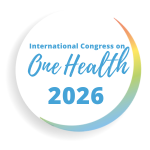|
|
|
Authors > WelcomeWelcome to the Authors ZoneAbstract submission is now open! Many thanks for your contribution. The Scientific Committee of OneH Congress 2026. Regular Sessions1. One Health effects of changesThe scientific session is expected to explore the complex and interlinked impacts of climate change, biodiversity loss, habitat destruction, and human activities on the emergence and re-emergence of infectious, vector-borne, and foodborne diseases. Particular emphasis will be placed on understanding how environmental disturbances and ecological imbalances contribute to shifting disease dynamics, as well as on the critical role of interactions at the interface between farm animals, human populations, and the environment. This integrative perspective aims to highlight the multifactorial drivers of health risks and to foster a One Health approach to disease prevention and management. 2. Enhanced Integrated surveillance: the way forward One Health indicatorsThe scientific session is expected to address strategies for improving the integration and coordination of surveillance systems across animal health, human health, and environmental health in order to strengthen early detection, monitoring, and response to diseases. Discussions will focus on how to harmonize data collection, analysis, and sharing across sectors, while also identifying challenges and opportunities for building more interconnected systems. A key objective will be to explore pathways for advancing the development and implementation of One Health indicators, providing measurable tools to assess intersectoral collaboration and to evaluate the health of ecosystems, animals, and humans in a comprehensive and synergistic manner. 3. One Health solutions and success storiesThe scientific session is expected to examine the main obstacles hindering the effective implementation of the One Health concept, including institutional, financial, technical, and policy-related challenges that limit cross-sectoral collaboration. At the same time, it will highlight successful One Health stories and practical solutions that have been applied in the field, particularly in relation to infectious, vector-borne, and foodborne diseases. By showcasing concrete examples of integrated approaches that have led to improved disease prevention, control, and resilience, the session aims to identify lessons learned and best practices that can inspire broader adoption and more effective operationalization of One Health principles worldwide. 4. New tools and new integrated data to meet One Health challengesThe scientific session is expected to showcase innovative approaches in data collection, management, and analysis, as well as the development of new tools designed to address the multifaceted challenges of One Health. Emphasis will be placed on how advanced technologies—such as digital platforms, big data analytics, artificial intelligence, and real-time surveillance systems—can enhance our ability to detect, predict, and respond to emerging threats at the human–animal–environment interface. By presenting practical examples of these approaches, the session will highlight how improved data integration and innovative methodologies can strengthen collaboration across sectors and contribute to more effective and sustainable One Health solutions. 5. Risk perception, communication and managementThe scientific session is expected to address the sociological and economic dimensions of a successful One Health transition, with particular focus on how risk perception, communication, and transdisciplinary risk management shape the effectiveness of health interventions. Discussions will explore the social factors influencing how communities and stakeholders understand and respond to health threats, as well as the economic implications of adopting integrated approaches to disease prevention and control. By examining strategies for fostering dialogue, trust, and collaboration across disciplines and sectors, the session aims to identify pathways for overcoming barriers and ensuring that One Health policies and practices are both socially acceptable and economically sustainable. |


